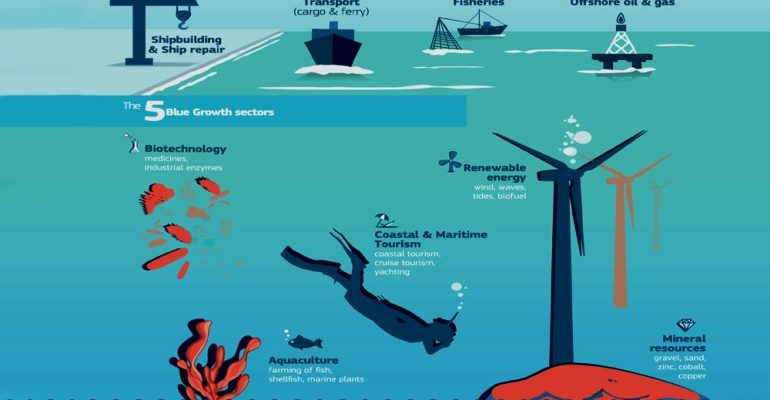By Moses Braimah
The Nigeria Cabotage Law, enacted in 2003, is a significant legislation that not only promotes but also regulates maritime activities within the country’s coastal waters. With its primary focus on coastal trade and transportation of goods and passengers, the law mandates that vessels engaged in such activities must be owned by Nigerians or Nigerian companies. This, in turn, leads to a certain percentage of Nigerian crew members, and establishes specific regulations for vessel financing, safety, and training. The overarching goal of the Cabotage Law is to boost local participation, stimulate economic growth, and foster capacity development in the Nigerian maritime industry.
RELATED: Importance of baseline data for the Ministry of Marine & Blue Economy
One of the fundamental elements of the Cabotage Law is the requirement for vessels involved in coastal trade to be owned exclusively by Nigerians or Nigerian companies. This element seeks to promote local ownership and active participation in maritime activities. By ensuring that vessels are owned by nationals, the law aims to enhance the Nigerian maritime industry’s growth trajectory, thereby increasing economic contributions and employment opportunities within the sector.
Additionally, the mandatory registration of vessels engaged in coastal trade with the Nigerian Maritime Administration and Safety Agency (NIMASA) is another pivotal aspect of the Cabotage Law. This stipulation ensures that vessels adhere to safety, security, and international maritime standards, thus safeguarding the marine environment and reducing risks associated with sub-standard vessels.
The establishment of the Cabotage Vessel Financing Fund (CVFF) is a proactive measure that aims to enhance local capacity and competitiveness. Through this fund, Nigerian operators can access financial assistance for vessel acquisition and fleet expansion. By providing funding opportunities for vessel upgrades and acquisition, the CVFF aims to reduce the nation’s dependence on foreign vessels while encouraging investment in domestic maritime resources.
A core objective of the Cabotage Law is the promotion of employment and training for Nigerian citizens. By requiring a certain percentage of Nigerian crew members on vessels engaged in coastal trade, the law addresses unemployment challenges and fosters skills development within the maritime sector. This not only enhances the employment prospects for Nigerian seafarers but also contributes to building a skilled and competent maritime workforce.
Furthermore, the Cabotage Law introduces a mechanism for limited waivers and exemptions for foreign vessels. These waivers are granted under specific conditions, such as the unavailability of suitable Nigerian-owned vessels or inadequate capacity. This provision offers flexibility while still safeguarding the interests of local maritime operators and ensuring that waivers are only granted when necessary.
To enforce adherence to the Cabotage Law, the legislation includes a range of penalties for non-compliance. These penalties may involve fines and even vessel detention. This rigorous approach aims to discourage illegal activities, encourage compliance with the law, and strengthen regulatory control over coastal trade operations.
Maritime training and capacity building are also central elements of the Cabotage Law. The law encourages the promotion of maritime education, training, and development to enhance the skills of Nigerian seafarers. By elevating the competence of the maritime workforce, the law contributes to the nation’s human capital development and creates a pool of skilled professionals who play a significant role in national growth.
Moreover, the Nigeria Maritime Administration and Safety Agency (NIMASA) is responsible for overseeing the enforcement of the Cabotage Law. NIMASA’s role includes the regulation of maritime services, including shipbuilding, repair, supply, and logistics. This oversight ensures that adherence to the law is upheld, promoting fair competition, safeguarding the interests of local maritime players, and enhancing the industry’s overall efficiency.
The concept of local content and indigenous participation is another crucial aspect of the Cabotage Law. It encourages the use of Nigerian-built vessels, equipment, and materials. Additionally, it promotes joint ventures between Nigerian and foreign companies, facilitating the transfer of technology and knowledge. This focus on local content stimulates the development of local industries, reduces reliance on imports, and fosters technology transfer, aligning seamlessly with the Ministry’s mandate for indigenous capacity development.
In conclusion, the Nigeria Cabotage Law and the Ministry of Marine and Blue Economy share a symbiotic relationship in their goals and objectives. The Cabotage Law’s key elements and benefits directly align with the Ministry’s mandates, including promoting the blue economy, sustainability, capacity building, investment in infrastructure, local content development, economic growth, and maritime security. Together, they forge a path toward fostering a thriving blue economy, promoting sustainable practices, enhancing maritime capacity, and ultimately contributing to Nigeria’s marine and maritime sectors’ development and success.

Author: Moses Braimah has over 20 years professional career as a brand, marketing, communication and public relations consultant.

































